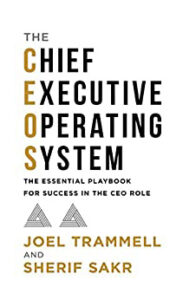In the dynamic realm of corporate leadership, ascending to the lead position of CEO is often considered the pinnacle of one’s career. Yet, contrary to popular belief, reaching this milestone is not akin to conquering Mount Everest; rather, it merely signifies the arrival at base camp. The journey to true greatness as a chief executive requires the acquisition of a distinct set of skills, distinct from those honed in previous managerial roles. In their insightful book, “The Chief Executive Operating System: The Essential Playbook for Success in the CEO Role,” seasoned CEO Joel Trammell and accomplished executive coach Sherif Sakr provide an indispensable and systematic guide to becoming an exceptional chief executive.
 Filling a notable void in the management literature surrounding CEO-specific guidance, the authors draw upon their extensive leadership experience and client work to present a practical operating system tailored explicitly for CEOs. Within these pages, readers will discover the paramount significance of understanding and effectively navigating through people, the five irreplaceable responsibilities that fall squarely upon the CEO’s shoulders, and the implementation of an operating system that empowers the entire organization to consistently deliver outstanding performance. As the CEO’s role reverberates across lives, livelihoods, and the broader economy, embarking on this transformative journey armed with the proven playbook found within “The Chief Executive Operating System” ensures that no CEO must face the challenges alone, guiding their organization towards a purposeful and prosperous future.
Filling a notable void in the management literature surrounding CEO-specific guidance, the authors draw upon their extensive leadership experience and client work to present a practical operating system tailored explicitly for CEOs. Within these pages, readers will discover the paramount significance of understanding and effectively navigating through people, the five irreplaceable responsibilities that fall squarely upon the CEO’s shoulders, and the implementation of an operating system that empowers the entire organization to consistently deliver outstanding performance. As the CEO’s role reverberates across lives, livelihoods, and the broader economy, embarking on this transformative journey armed with the proven playbook found within “The Chief Executive Operating System” ensures that no CEO must face the challenges alone, guiding their organization towards a purposeful and prosperous future.
We had a chance to catch up with one of the authors for an exclusive interview. This is what Joel Trammell had to say.
As a successful CEO and author of multiple books geared toward the CEO, you have certainly given a wealth of knowledge and advice to the CEO industry. What is the best piece of advice that was ever given to you?
More so than direct advice, I’ve learned the most from the examples of people around me. In high school, I was fortunate to know two people who were entrepreneurs, though that word wasn’t used much back then. I looked up to them and tried to learn everything I could about what they did, how they started and ran their businesses. I also had a commanding officer in the Navy who was a big inspiration for me from a leadership perspective.
What is a common mistake you see CEOs today making and what is the fix to turn that around for them?
Lots of CEOs become cheerleaders for the business in a way that undermines trust. CEOs do have to get people excited about the future, but they also have to be realistic. In uncertain times, the “cheerleader CEO” tends to gloss over unpleasant realities, overpromise on what the company can deliver, and get their ego involved in how the company performs. Like everything with the CEO role, it’s a balance. To keep yourself from falling off the cheerleader side of the tightrope, you’ve got to hold yourself accountable to reality and realize that when you’re honest with your employees and other stakeholders
Authoring The Chief Executive Operating System, where you are guiding readers to hone their skills to become effective CEOs, is probably vastly different than authoring a typical fictional book. Can you describe your style in writing this book?
I think of myself as a teacher first, author second. So to write a book I first think about how I would teach the material and list out all the concepts that I am trying to get across. From that outline the meat of the book is fairly easy to put together. At that point it is all about working with the editor to polish the presentation for maximum impact.
What is the biggest risk you ever took in life and how did it pay off?
Starting my own business when I got out of the Navy instead of getting a “real job.” I had an engineering degree and was reasonably employable, and once you get out of the career track, it’s hard to get back into the corporate workforce where you might want to be. It felt risky to take a gamble on entrepreneurship.
After a long work week, what is your ideal way to spend your weekend?
Family time. And fishing out at Texas CEO Ranch. Our ranch outside Austin is where we do most of our retreats for training CEOs and managers. It’s a great spot and you’ll find me there by the pond on a lot of weekends.












